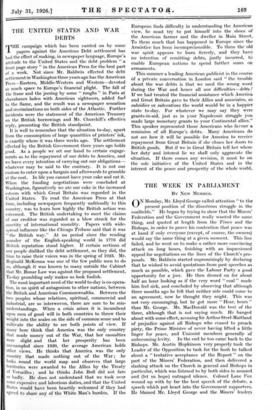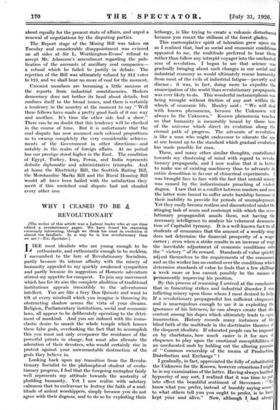THE WEEK IN PARLIAMENT .
BY NEW MEMBER.
ON Monday, Mr. Lloyd George called attention " to the present position of the disastrous struggle in the coalfields." He began by trying to show that the Miners' Federation and the Government really wanted the same thing, and quoted at length from the Times and the Bishops, in order to prove his contention that peace was at hand if only everyone (except, of course, the owners) would say the same thing at a given moment. This line failed, and he went on to make a rather more convincing attack on long hours, finishing with an impassioned appeal for negotiations on the lines of the Church's pro- posals. Mr. Baldwin started unpromisingly by declaring that he wished to avoid quotations from past speeches as much as possible, which gave the Labour Party a good opportunity for a jeer. He then droned on for about half an hour looking as if the very word " coal " made him feel sick, and concluded by observing that although three months ago he felt that neither side could come to an agreement, now he thought they might. This was not very encouraging, but he got more " Hear, hears " than Mr. George. Mr. MacDonald was the best of the three, although that is not saying much: He banged about with some effect; accusing Sir Arthur Steel-Maitland of prejudice against all Bishops who ceased to preach piety, the Prime Minister of never having lifted a little finger for peace, and Unionist members generally of unbecoming levity. In the end he too came back to the Bishops. Mr. Austin Hopkinson very properly took the Leader of the Opposition to task for the bosh he talked about a " tentative acceptance of the Report " on the part of the Miners' Federation, and then delivered a slashing attack on the Church in general and Bishops in particular, which was listened to by both sides in amazed and (let us hope) outraged silence. Colonel Lane Fox wound up with by far the best speech of the debate, a speech which put heart into the Government supporters. He blamed. Mr. Lloyd George and the Miners' leaders. about equally for the present state of affairs, and urged a renewal of negotiations by the disputing parties.
The Report stage of the Mining Bill was taken on Tuesday and considerable disappointment was evinced on all sides at Sir L. Worthington-Evans' refusal to accept Mr. Adamson's amendment regarding the pub- lication of the accounts of ancillary coal companies— a refusal which he failed to justify in debate. The rejection of the Bill was ultimately refused by 812 votes to 125, and we shall hear no more of coal for the moment.
Unionist members are becoming a little anxious at the reports from industrial constituencies. Modern democracy does not bother its head about details, but confines itself to the broad issues, and there is certainly a tendency in the country at the moment to say " Well these fellows have made a pretty good hash of it one way and another. It's time the other side had a show." There can be no doubt that this tendency will be checked in the course of time. But it is unfortunate that the coal dispute has now assumed such colossal proportions as to swamp completely the very considerable achieve- ments of the Government in other directions—and notably in the realm of foreign affairs. At no period has our prestige stood higher in the East. The condition of Egypt, Turkey, Iraq, Persia, and India representa definite diplomatic and administrative triumphs. And at home the Electricity Bill, the Scottish Rating Bine the Merchandise Marks Bill and the Rural Homing Bill would all have been hailed with the satisfaction they merit if this wretched coal dispute had not clouded every other issu



































 Previous page
Previous page